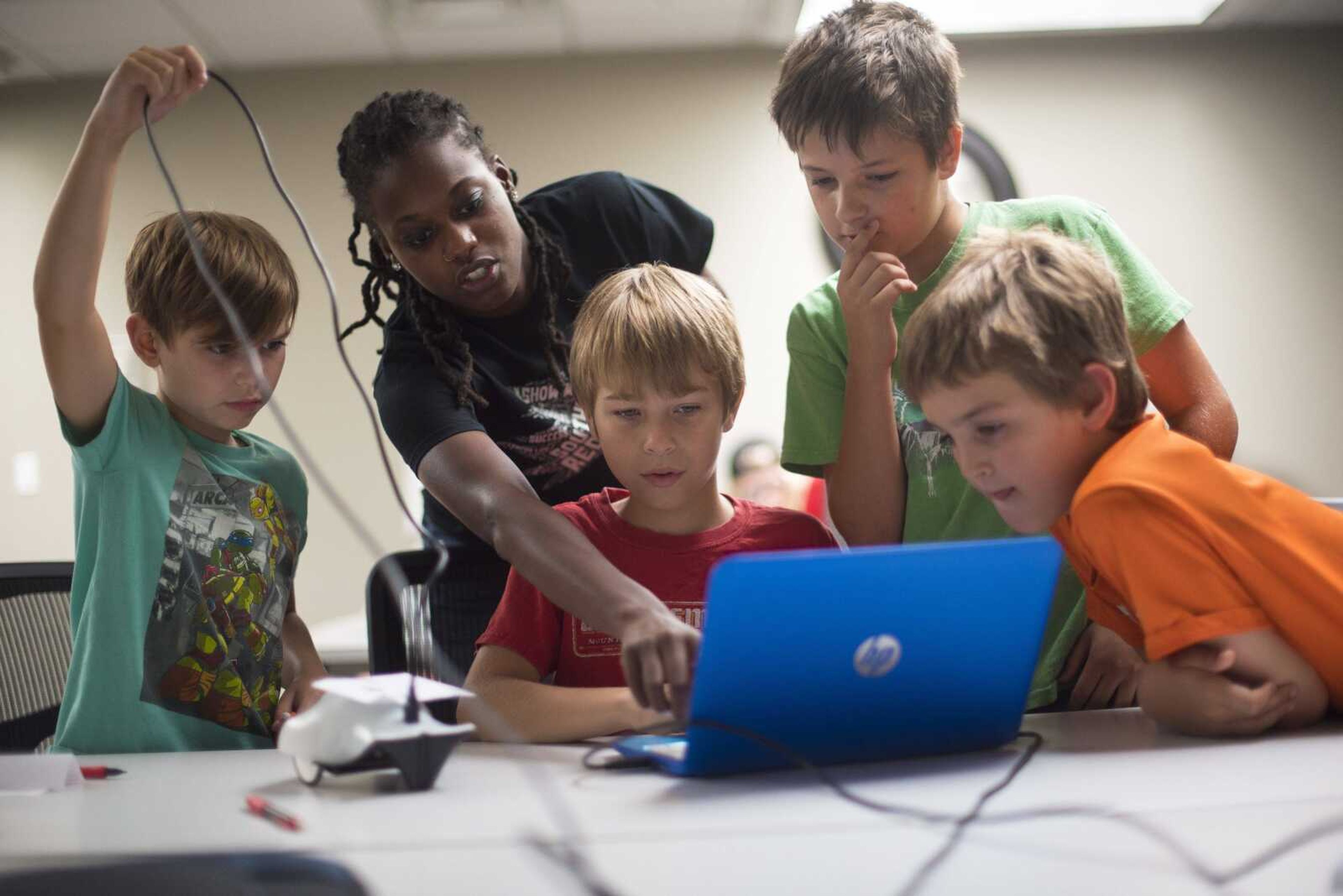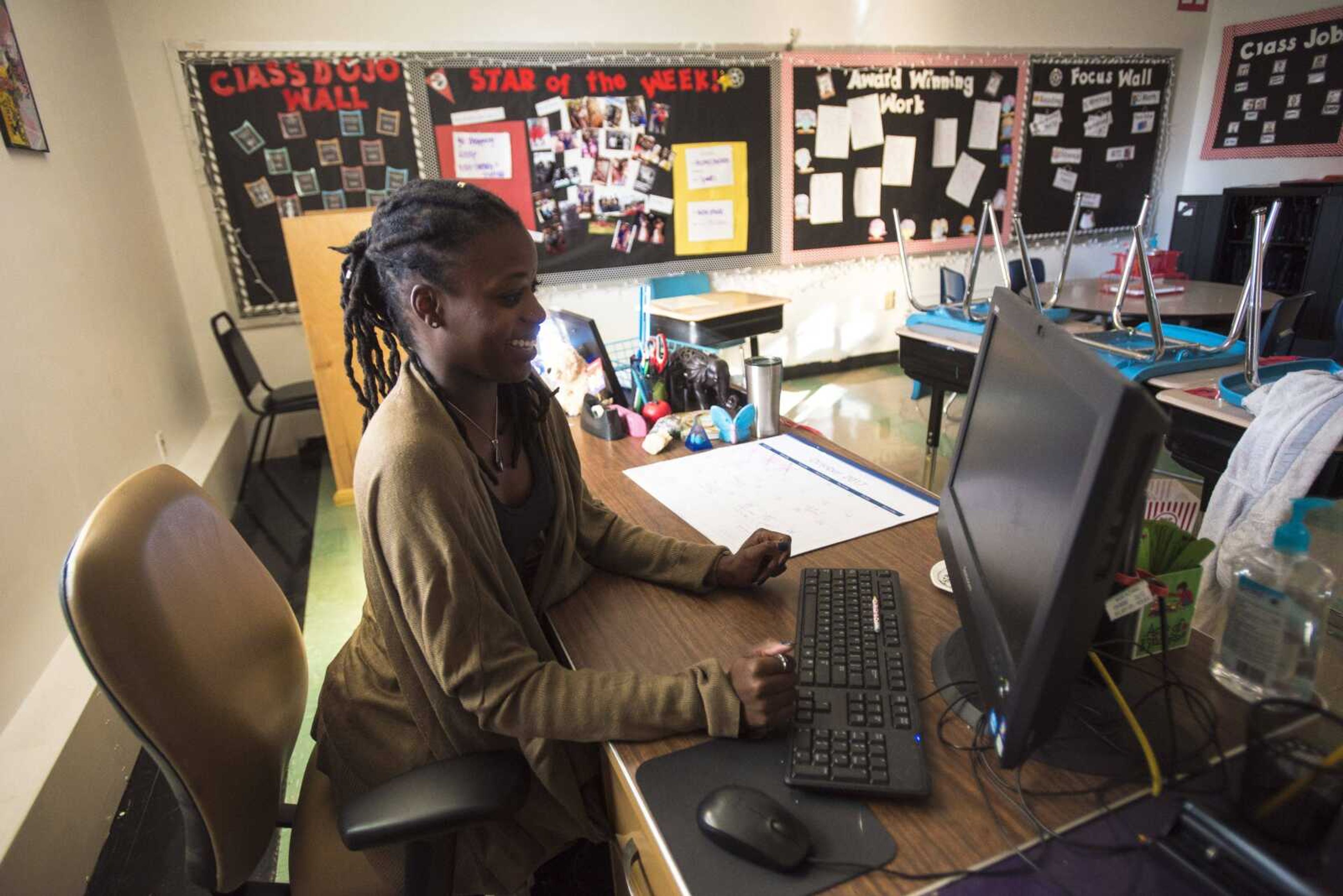Fourth-grade teacher Andrea Cox teaches students how to code, adapt to new technology
She has a deep passion for technology, and both her parents worked with computers while in the military. Her father works for MasterCard, for whom he does computer coding. "My parents were surprised, too," Cox says with a laugh when her choice of profession is brought up...
She has a deep passion for technology, and both her parents worked with computers while in the military. Her father works for MasterCard, for whom he does computer coding.
"My parents were surprised, too," Cox says with a laugh when her choice of profession is brought up.
However, it's later discovered they were a generation skipped when it came to instructing, and there is some devotion to imparting ABCs in her DNA.
Both her grandmothers were teachers.
And their enthusiastic, high-energy granddaughter is wired for the profession.

"I love teaching. I love my job," said the second-year teacher at Jefferson Elementary in Cape Girardeau. "I think the most rewarding part of teaching is the kids because they teach me, and they say some of the craziest things."
She chuckles at her words before proceeding.
"Like I have some of the best stories when I come home at night," she says. "They teach me a lot, and I teach them a lot. I like the relationships you get to build with your kids."
She teaches the traditional subjects of reading, writing, math and science.
Unlike her grandmothers, the 2011 graduate of McCluer North High School in St. Louis gets to impart technology, whenever possible.
Cox worked for Codefi over the summer, directing a two-week camp where youths learned to code robots, and she has employed some of the same equipment and passion in her classroom.
On a recent STEM day, one in which the school devoted the entire day for its third- and fourth-graders to science and technology, Cox chose to use the coding and the Finch robots employed over the summer to engage her students.
"They thought it was the coolest thing ever," Cox says about the reaction on STEM day.
Cox preprogrammed the robots to perform certain functions, but directed the students in how to use coding on the computer to control the actions of the Finches, some of which were sounds, pronouncing names or following a flashlight beam, but also allowing for free rein.
"They were really fascinated the robot did exactly what they wanted, but they were also fascinated that it did the opposite of what they wanted," Cox says. "You could tell them to say something, but if you didn't phonetically type it out, it didn't say what you had typed. I think they were just really surprised at what it could and couldn't do."
The students used a basic form of Scratch, a computer language, to code, or not to code.
"They were discovering if they didn't put the code in right, it wouldn't work," Cox said.
Cox called it an "inside field day" for the students, who got a break from the daily routine, although they are exposed to technology on a regular basis through Chromebooks, iPads and SMART boards on a daily basis.
Cox sees herself at an ideal position in the foremost grade of the elementary school. She calls them the perfect age for her, noting she's not wiping noses and tying shoes.
"Little kids are cute, but they can't do anything. I need you to have some skills," Cox says with a laugh.
She knows her fourth-graders each will have personal computers next year when they reach the fifth grade, where she did her student teaching two years ago at Cape Girardeau Central Middle School while attending Southeast Missouri State University.
She has 13 students in her class, and tries to give them a dose of technology whenever possible, whether it be 15 or 20 minutes of idle time after a test on a Friday, doing something like getting on Google Maps and exploring the International Space Station.
Ideally, she says she would immerse them once a week in technological learning, but more realistically settles for once a month.
"Just as much as I love that, I still have to teach them how to read and write and send them to fifth grade with a lot of skills that they don't have today," Cox says.
She's a technological resource away from the classroom, often fielding calls from her parents with questions about their phones or computer problems. She'll troubleshoot on FaceTime.
"I am just tech savvy, so I try to share that with [my students], not just because it's personal, but by the time they get to high school, who knows what's going to be invented or out," she says. "I want them to be as ready for any kind of technology I can prepare them, so as much as I like it, it's going to benefit them, too. It kind of works in both our favor."
She witnessed them processing information while messing with the coding for the Finches, figuring things out in about "five minutes" as they took on a new challenge for the first time. It makes her believe all the more in exposing them to as much technology as possible.
"I just want them to be as ready for and to use any type of technology they ever encounter," Cox says. "I think that would be a good way to sum it up. Everything just changes so much. I just think to make them as prepared and adaptable, even if they've never used it, able to pick it up and figure out how to use it, which we're learning every day."
Connect with the Southeast Missourian Newsroom:
For corrections to this story or other insights for the editor, click here. To submit a letter to the editor, click here. To learn about the Southeast Missourian’s AI Policy, click here.










